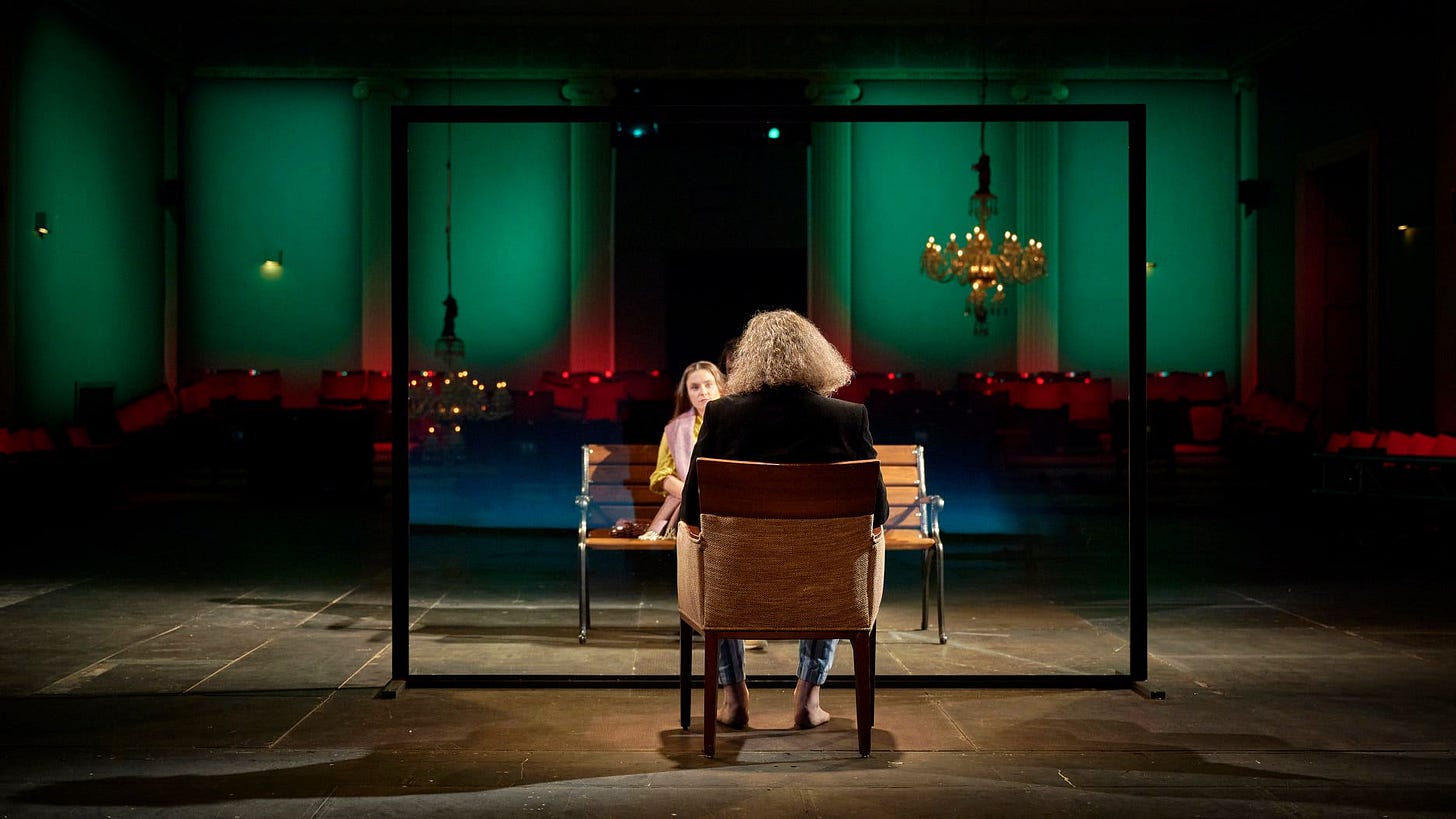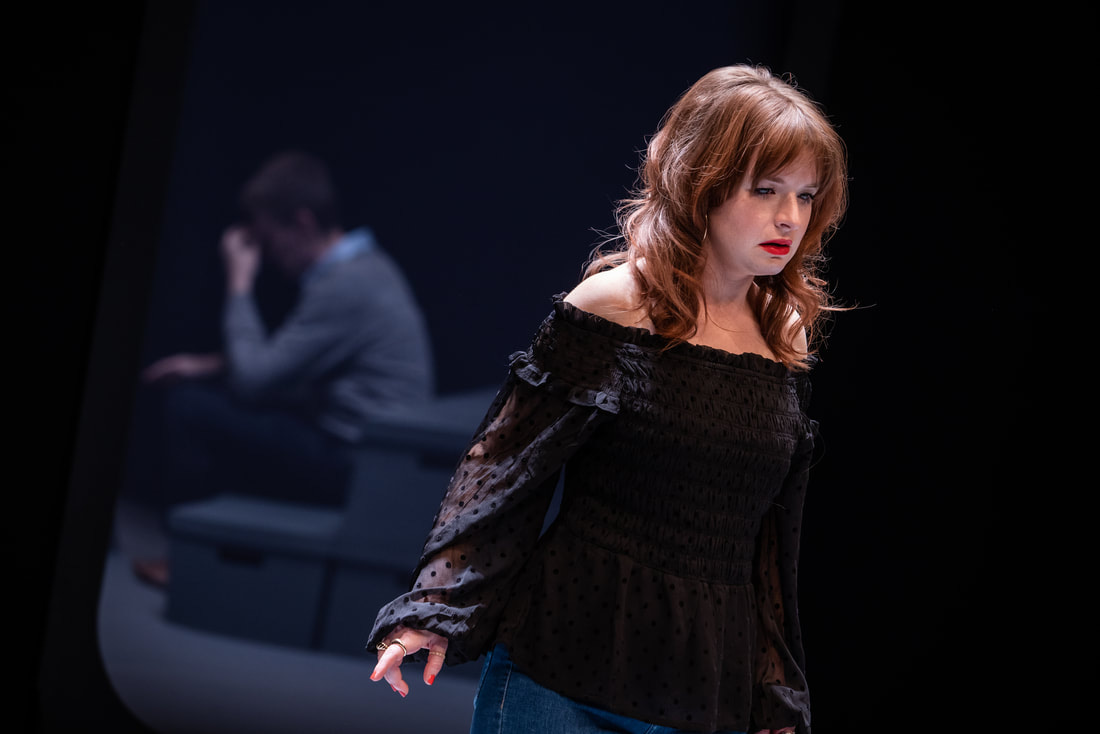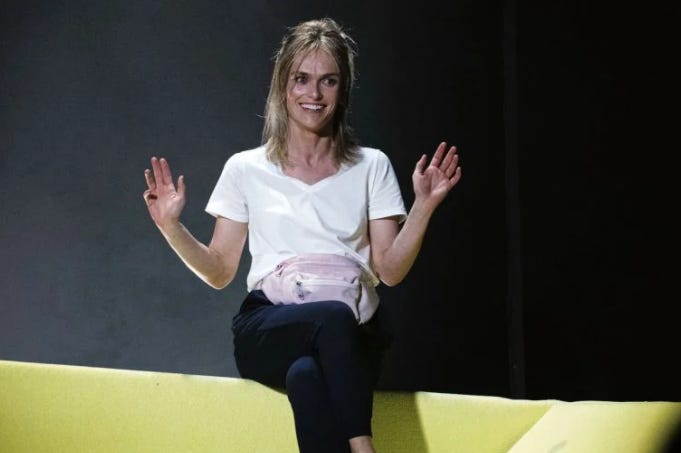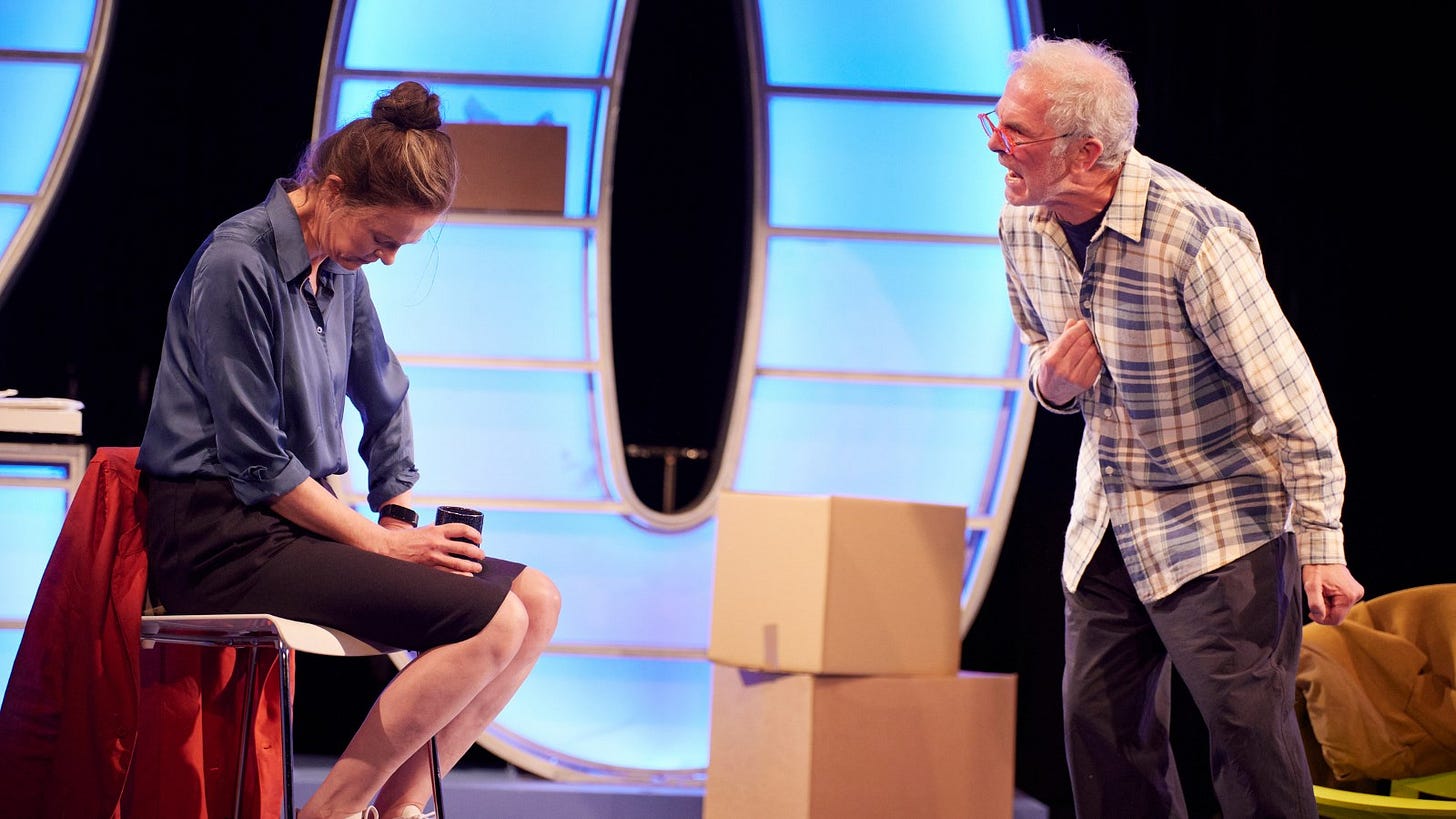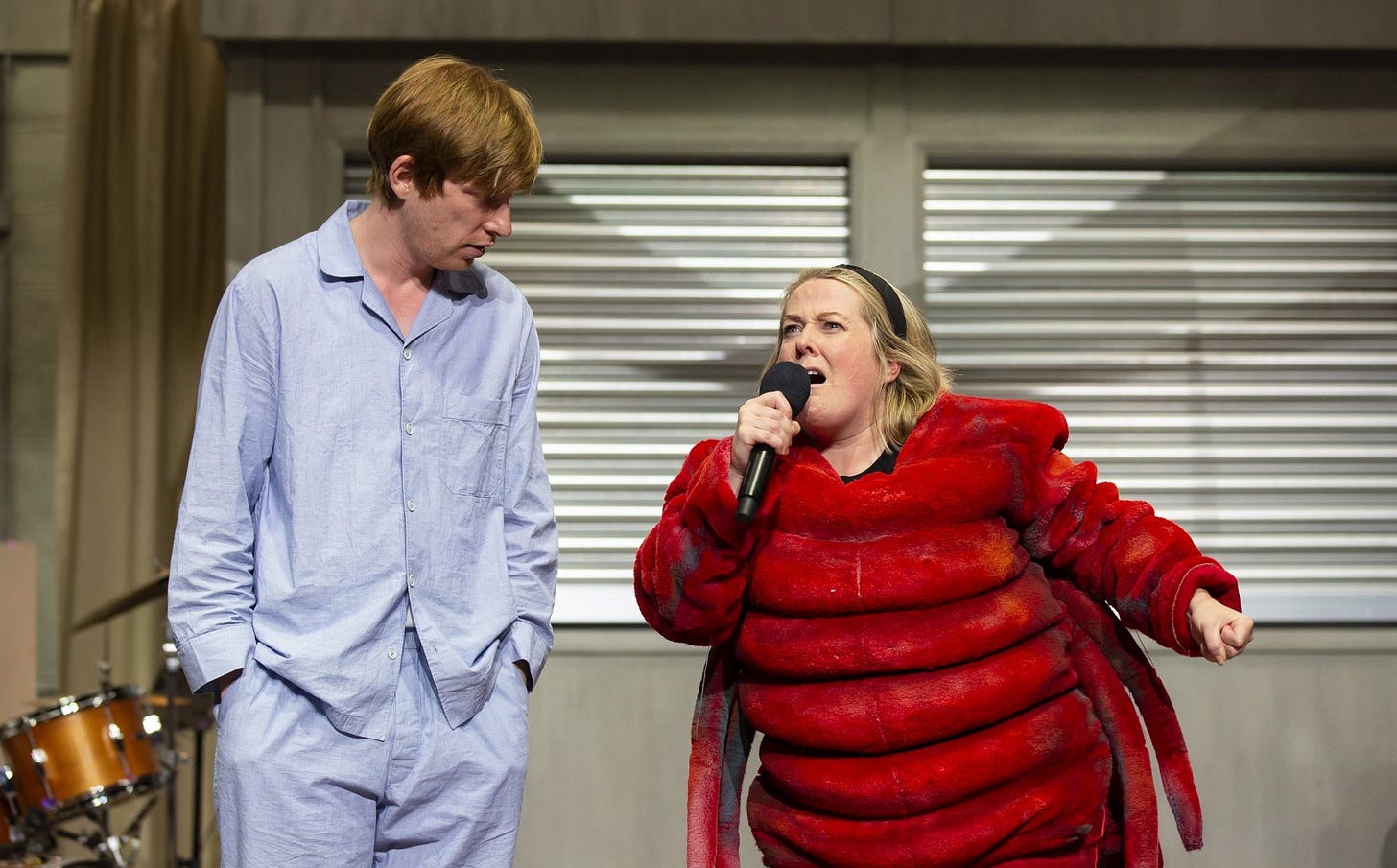2021: the best theatre of the year
A horror-opera, an absurdist classic, and dramas about conspiracy theories and casual sex

It was surreal when, halfway through 2021, a whole new category of plays emerged out of the blue. The decision of the industry to label them “in person” plays was probably because “live” was already taken – it had become the achievement of streamed theatre. People were getting the word out that a long weary lockdown was over, that plays were returning to physical venues. The identifier was a bearer of glad tidings but it was also one hell of a doublethink: who’d thought we’d someday need to emphasise some plays as being “in person”?
Streamed theatre was how the medium adapted to survive, and my favourite moments below recognise both the innovation of those experiments while also paying attention to in-person plays from the latter half of 2021. This is the first year since I’ve begun making these lists where the numbers don’t reflect the funding hierarchy, with either the Gate Theatre, Abbey Theatre or Irish National Opera showing the most. Landmark Productions has 10 mentions, with three of their productions popping up time and again. The runner-up is Thisispopbaby, cited seven times for the outstanding drama Conversations After Sex.
BEST DIRECTOR
With the horror-opera The First Child, Enda Walsh told a shocking story of tragedy in suburbia via a Gesamtkunstwerk of music, design and movement. Caitríona McLaughlin dared to expose the darker side of the absurdist classic Happy Days (considered as one of Samuel Beckett’s more upbeat plays) and turned it into a bitter marriage war. Conversations After Sex followed a woman’s casual sex encounters over the course of a year, and Where Sat the Lovers was concerned with loved ones warped by conspiracy theories, and both plays’ directors succeeded in making the scale of the drama breathtakingly intimate, despite showy time-jumps and elaborate performances.
Tom Creed – Conversations After Sex, a Thisispopbaby production
Caitríona McLaughlin – Happy Days, an Olympia Theatre and Landmark Productions co-production
Claire O’Reilly – Where Sat the Lovers, a Malaprop production
Enda Walsh – The First Child, a Landmark Productions production
BEST SET DESIGN
In some streamed plays, set design recombined familiar environs into new displays, using the architecture of empty theatres to trigger our ache to be back inside those buildings. That was certainly the case with Katie Davenport’s dazzling transformation of the Gate Theatre’s auditorium for The Visiting Hour, its lowered chandeliers and vibrantly red seats evoking the music halls remembered by a man drifting with dementia. Happy Days buries its central character up to the neck in earth, but Jamie Vartan made the biting decision to have the soil topple in through doorways and windows, as if inside a gigantic house, at a time when we could barely leave our own homes. In Molly O’Cathain’s apartment set for Where Sat the Lovers, banal objects were transfigured into impressive, poetic metaphors for the play’s references to laws of physics. The Book of Names saw Owen Boss’s fastidious design transform two warehouses into treacherous battleground during the War of Independence.
The Book of Names, an Anu and Landmark Productions co-production - Owen Boss
The Visiting Hour, a Gate Theatre production - Katie Davenport
Where Sat the Lovers, a Malaprop production - Molly O’Cathain
Happy Days, an Olympia Theatre and Landmark Productions co-production - Jamie Vartan
BEST LIGHTING DESIGN
There were fewer moments of pure poetry that when a shaft of light, penetrating a dark prison cell, perfectly caught the face of a bloody political prisoner in Fidelio, while singing of his faith in being rescued. In John Gunning’s inventive displays for Where Sat the Lovers, even the shadows from lights hitting a living-room clotheshorse seemed a reference to theoretical physics. Sarah Jane Shiels gave Conversations After Sex a fittingly noir ambience, with blades of halogen-yellow street lighting peering into private bedrooms, as if the entire play was hidden under the shadow of a city. A devastating montage in To the Lighthouse, where several of the characters in Virginia Woolf’s story drop like flies, was narrated by figures disappearing into the white heat of Aedín Cosgrove’s awe-inspiring lighting.
To the Lighthouse, a Hatch Theatre and The Everyman co-production – Aedín Cosgrove
Where Sat the Lovers, a Malaprop production – John Gunning
Fidelio, an Irish National Opera production - Paul Keogan
Conversations After Sex, a Thisispopbaby production – Sarah Jane Shiels
BEST COSTUME DESIGN
The most obvious question for costume design is: what can it not do? In the case of Happy Days, a canonically benign character such as Willie, seen floundering in the background while his wife becomes increasingly trapped in earth, can be altered into an unsettling, mustachio-twirling villain. A bright green boilersuit appropriate for a children’s costume party can contain hidden references to a widely-forgotten Anglo-Irish aviator in Mabel’s Magnificent Flying Machine. An absurdist 90s’ talk-show in Masterclass skewered macho artists by dressing manly speakers as poseurs, complete with beret and sideburns. Of course, costuming also reveals and conceals the human body, and Sarah Bacon’s flexible design both exposed and protected the lovers of Conversations After Sex.
Conversations After Sex, a Thisispopbaby production – Sarah Bacon
Mabel’s Magnificent Flying Machine, a Gate Theatre production – Owen Boss
Masterclass, a Brokentalkers and Adrienne Truscott co-production – Sarah Foley
Happy Days, an Olympia Theatre and Landmark Productions co-production – Jamie Vartan
BEST SOUNDSCAPE
During Murmuration’s installation-play You’re Still Here, which showed a fraught reunion between siblings trying to settle what to do with their inherited home, the audience listened to characters’ guarded conversation through headphones. Melancholy swelled in orchestral arrangements during Mabel’s Magnificent Flying Machine, Daniel Fox’s noise-rock composition nudged the choreography in the urban fairy tale Night Dances, and Philip Stewart’s music lent cathedral-drama to the philosophical guessing of To the Lighthouse.
Night Dances, a United Fall and Dublin Theatre Festival co-production – Daniel Fox
Mabel’s Magnificent Flying Machine, a Gate Theatre production – Carl Kennendy
You’re Still Here, a Murmuration production - Jennifer O’Malley
To the Lighthouse, a Hatch Theatre and The Everyman co-production – Philip Stewart
BEST VIDEO DESIGN
Special praise here for José Miguel Jiménez, whose ghostly displays were a highlight of some streamed plays. In To the Lighthouse, while a family and their guests irked with hostility at the dinner table, a video projection held a bittersweet, more hospitable sight of friends leaning into the warm comforts of good company. There were stinging signs of a better existence, too, in the dance Dēmos, which followed masked dancers unable to physically connect in the pandemic. Choreographer Liz Roche’s production streamed from the Abbey Theatre’s stage – where it had been programmed pre-COVID – and as it roved backstage and into the auditorium, the interiors were filled with chilling projections of absent musicians and dancers, as if the venue was haunted by its own suspended programming. Also of note here is Jack Phelan’s work on The First Child, whose displays became a brutal puzzle piece to the opera’s suspenseful plot.
Dēmos – Films of Separation and Togetherness, a Liz Roche Company and Crash Ensemble co-production - José Miguel Jiménez
To the Lighthouse, a Hatch Theatre and The Everyman co-production - José Miguel Jiménez
The First Child, a Landmark Productions production – Jack Phelan
BEST MOVEMENT
What stood out was the slapstick of Eddie Kay’s movement direction for Masterclass, and the gentleness with which Sue Mythen guided the intimacy in Conversations After Sex. How nice to welcome Jérémie Cyr-Cooke, whose high-energy choreography in the dance Embodying Glass saw a man summoning courage to survive lockdown. A woman commits an unforgivable crime in The First Child but, in the opera’s haunting final moments, a child version of the woman is seen writhing in Emma Martin’s sad movement. It’s a glimpse into a neglectful childhood, a past that the opera never fully divulges, as if to complicate anyone’s dehumanising judgement of her adult self.
Embodying Glass, a Cuisle Productions and Galway Music Residency co-production - Jérémie Cyr-Cooke
The First Child, a Landmark Productions production – Emma Martin
Conversations After Sex, a Thisispopbaby production – Sue Mythen
Masterclass, a Brokentalkers and Adrienne Truscott co-production – Eddie Kay
BEST NEW PLAY
Conversations After Sex, the latest once-in-a-decade solo play by Mark O’Halloran, was an outstanding work of painstaking detail, as its bedfellows gently revealed stories about their lives. Admirably, it also refused any easy answers for how wounded people put themselves back together. In Masterclass – the magnificent satire by Feidlim Cannon, Gary Keegan and Adrienne Truscott – we got a send-up of James Lipton’s Inside the Actors Studio, and how we’ve all knelt at the feet of male crooks whose creativity got to be considered ambitious. Not only was this a skewering of toxic myths about male aggression in creative industries – it also evolved into a complex debate about privilege and derailed careers. Masterclass borrowed from real life furore surrounding Oleanna, David Mamet’s woeful rape accusation play, which also seemed to be somewhere in the consciousness of Duck Duck Goose. Caitríona Daly’s excellent drama was written after the Belfast rape trial, and presents uncertainties of innocence and guilt within something resembling a horror play, complete with its own unmasked villain in the end. (The scariest parts are the judgements you arrive at yourself along the way). Finally, Sarah Hanly gave us a terrific bad-girl comedy running rampant through Catholic Ireland in Purple Snowflakes and Titty Wanks, which was equal parts funny and startling.
Feidlim Cannon, Gary Keegan and Adrienne Truscott – Masterclass, a Brokentalkers and Adrienne Truscott co-production
Caitríona Daly – Duck Duck Goose, a Fishamble production
Sarah Hanly – Purple Snowflakes and Titty Wanks, an Abbey Theatre and Royal Court Theatre co-production
Mark O’Halloran – Conversations After Sex, a Thisispopbaby production
BEST PERFORMANCE
The field is crammed with four productions in particular. The achievement of Aidan Gillen, Niamh Cusack and Nigel Lindsay was not only in making the infamously long monologues of Faith Healer riveting to watch, but also in finding fresh new approaches to portraying the play’s inconsolable miracle curer and his travelling companions. It’s difficult to picture anyone other than Derbhle Crotty as Mrs. Ramsay, the redoubtable host in To the Lighthouse, who had to thresh against her academic husband’s insecurities while uplifting her guests. Similarly, few could give a comic self-conscious performance of Mr. Ramsay’s self-doubt like Declan Conlon, nor as piteous a portrayal of grief. The incredible bluffness of Feidlim Cannon, playing an interviewer in Masterclass, conspired brilliantly with the ridiculous machismo of Adrienne Truscott, playing an artist who is a terrible man. If Kate Stanley Brennan had to stealthily chart an anonymous woman’s struggle with grief in Conversations After Sex, her co-star Fionn Ó Loingsigh had to be even more discreet, transforming into several of the woman’s admirers, in a multiple-role performance that could easily be distractible, but instead was always persuasive. Also in the mix is Siobhán McSweeney’s performance as Winnie in Happy Days, a woman whose daily optimism has been previously portrayed as extravagant and actorly, but McSweeney made her high-handed, condescending, as if resentments after a lifetime of marriage were barely repressed.
Feidlim Cannon – Masterclass, a Brokentalkers and Adrienne Truscott co-production
Declan Conlon - To the Lighthouse, a Hatch Theatre and The Everyman co-production
Derbhle Crotty - To the Lighthouse, a Hatch Theatre and The Everyman co-production
Niamh Cusack – Faith Healer, an Abbey Theatre production
Aidan Gillen – Faith Healer, an Abbey Theatre production
Nigel Lindsay – Faith Healer, an Abbey Theatre production
Siobhán McSweeney – Happy Days, an Olympia Theatre and Landmark Productions co-production
Fionn Ó Loingsigh – Conversations After Sex, a Thisispopbaby production
Kate Stanley Brennan – Conversations After Sex, a Thisispopbaby production
Adrienne Truscott - Masterclass, a Brokentalkers and Adrienne Truscott co-production
BEST ENSEMBLE
The accolade for plays where singling out a lone performance is impossible. The cast of Three Short Comedies by Seán O’Casey worked together to create remarkable slapstick. It’s possible the humour of Druid’s play was matched only by the absurdist opera The First Child, which, for all its unsettling subject matter, also had an excellent cast leaning into character-types from classical comedy. What a joy it was to watch the top-notch crew of The Treaty become both sides of the table during the Anglo-Irish Treaty, or to see everyone on fine form in The Book of Names, another War of Independence drama. The cast of You’re Still Here gave one of the most touching group efforts of the year, as three siblings negotiating a conversation changing their lives forever.
The Book of Names, an ANU and Landmark Productions co-production
Three Short Comedies by Seán O’Casey, a Druid production
The Treaty, a Fishamble production
The First Child, a Landmark Productions production
You’re Still Here, a Murmuration production
NOTES
BEST BREAKTHROUGH
Not so much a category for artists’ debuts with established companies than for performances that felt noteworthy, as if they marked the beginning of greater critical recognition of their work. That was certainly the case for Juliette Crosbie and Desmond Eastwood – Crosbie gave a complex performance, as both a love interest and a dubious authority figure, in Where Sat the Lovers, while Eastwood superbly charted the arc of a young gay activist, from judgemental intellectual to compassionate lover, in Once Before I Go. Niamh O’Sullivan gave a revelatory, comic performance as a cruel wife in The First Child. Finally, after COVID delays, we got to see Purple Snowflakes and Titty Wanks, which introduced Sarah Hanly as a scathing, contemporary playwright, whose dark comedy draws from the same well as Phoebe Waller-Bridge.
Juliette Crosbie – Where Sat the Lovers, a Malaprop production
Desmond Eastwood – Once Before I Go, a Gate Theatre production
Sarah Hanly - Purple Snowflakes and Titty Wanks, an Abbey Theatre and Royal Court Theatre co-production
Niamh O’Sullivan – The First Child, an Irish National Opera production
BEST COMEBACK
Think back to the idyllic, middle years of the previous decade and you might remember the last time you saw some of these. In Once Before I Go, Sean Campion gave a touching performance as a man recovering from a downward spiral of grief and drugs, after being an activist during the AIDs crisis. How delightful it was to see Joe Dowling make his greatest production in years, with a new, definitive interpretation of Brian Friel’s Faith Healer, which also brought home Niamh Cusack (last seen on a Dublin stage in 1984). It’s been a while since we had a new play from Frank McGuinness, and The Visiting Hour was quite the trip, with a woman venturing into the illusions of her father’s dementia, in the hope of meeting him there
Sean Campion - Once Before I Go, a Gate Theatre production
Niamh Cusack - Faith Healer, an Abbey Theatre production
Joe Dowling - Faith Healer, an Abbey Theatre production
Frank McGuinness - The Visiting Hour, a Gate Theatre production
WORST PRODUCTION
Some of these ran the gamut from confusing to deliberately obscure. In Middletown was a surreal comedy about a furniture-removal man embarking on a nomadic life on the road, but it refused to let its character motivations come into focus, while engaging with themes of captivity and poetry reminiscent of Enda Walsh’s drama. Speaking of, it’s difficult to fathom why Medicine made Domhnall Gleeson, in a performance of gentile fragility as a hospital patient, compete against loud drums onstage, while the play randomly gave itself away to its nutty drama-therapists. Those who could keep up with iGirl, Marina Carr’s mythological-historical play, and Straight to Video, a turbo-charged comedy with an implausible time-travelling twist, are better than me. The idea for The Saviour seemed innovative, presenting a Magdalene survivor as a life-grabbing woman resembling Molly Bloom, but it ended up heavy-handed.
iGirl, an Abbey Theatre production
In Middletown, a Gate Theatre production
Medicine, a Landmark Productions and Galway International Arts Festival co-production
Straight to Video, a Landmark Productions production
The Saviour, a Landmark Productions production
WHAT I MISSED WHILE LOOKING IN THE WRONG PLACES
I don’t know which I regret more. I would have loved to catch Joan Sheehy’s take on In the Middle of the Fields, Mary Lavin’s short story about a widowed woman striking up a gentle – and sometimes uneasy - relationship with a man contracted to work on her land. Druid staged Thomas Kilroy’s Irish-transplanted version of Chekhov’s The Seagull in the big-house grounds of Coole Park. It sounds like choreographer Luke Murphy, who conceived Volcano with Will Thompson, broke new ground with a sci-fi thriller full of lockdown resonances. Hunting Darwin was the latest adventure play by Blue Raincoat, based on the real-life story of Antarctic explorers searching for an emperor penguin egg. Mass was the new one from The Belfast Ensemble (who gave us the lacerating Abomination: A DUP Opera), weaving projections by queer filmmakers living in oppressive societies into an opera with the structure of a Catholic mass.
Hunting Darwin, a Blue Raincoat production
In the Middle of the Field, a Joan Sheehy production
Mass, an Outburst Queer Arts Festival, Belfast Ensemble and the Ulster Orchestra co-production
The Seagull, a Druid production
Volcano, an Attic Projects production
Like what you read? Buy me a coffee at https://ko-fi.com/chrismccormack




